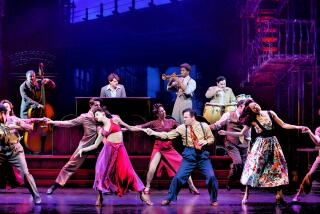A Nuanced Mozart Is Guidedby Casanova in Shaping an Opera
- Share via
Few figures in music are more attractive to the imagination than Wolfgang Amadeus Mozart. From what sources came the glorious melodies that poured forth from this boy-man in rapid unhesitant pen strokes, across pages and pages of manuscript?
That no one knows the answer to that question has not deterred more than two centuries of speculation. The current image of Mozart fixed in the popular mind is probably that from “Amadeus,” the play by Peter Shaffer made into the movie of the same name. Shaffer portrayed Mozart as almost divinely talented but irredeemably childish. In his first novel, “Imagining Don Giovanni,” Anthony Rudel draws a more nuanced and plausible picture. His Mozart is both innocent and all-knowing, capable of expressing in his operas all of mankind’s emotions and frailties, yet resolving all discord in forgiveness and love.
Rudel, author of “Tales from the Opera” and “Classical Music Top 40” and the son of the conductor Julius Rudel, builds his novel on the known fact that Giacomo Casanova, the famous roue, was in Prague in October 1787 when Mozart and his librettist, Lorenzo Da Ponte, were struggling against a deadline to finish the opera “Don Giovanni.” Rudel has Casanova, who was then writing his famous memoirs of erotic conquests, guide Mozart into refining the character of the legendary Spanish womanizer Don Juan so that, in spite of his insatiable appetite, he is yet attractive to women.
As Mozart, then 31, is wrestling with the opera, he is besieged by beautiful women while his beloved young wife, Constanze, with him in Prague, is tormented by love and doubts about his fidelity. “Imagining Don Giovanni” poses two questions: Will the opera be finished? We know the answer to that one. And will Mozart remain faithful to Constanze? The novel argues that he will: To prove to himself that he is attractive to women, he puts himself in situations in which they can show their affection but in which these affairs of the heart cannot be consummated.
The novel has its flaws. The plot is melodramatic, but then, so is much opera. Some of the dialogue is anachronistic and unintentionally funny:
“Lorenzo, where are you going?” Mozart called [to Da Ponte].
“Vienna. I have to see the Emperor.”
“For heaven’s sake, why?”
“I have two other librettos to present. Salieri wants me there, so I have to go.” (Antonio Salieri is the court composer whose jealousy of Mozart’s greater talent was a central theme of “Amadeus.”)
But on the whole, “Imagining Don Giovanni” offers a stimulating look at Mozart and his world. It was a glittery Viennese society of noblemen’s fancy dress balls and rigid hierarchy at the top of which was the Holy Roman Emperor. But it was also a society on the brink of revolution. Mozart’s popular “The Marriage of Figaro,” based on the play by Beaumarchais, had already hinted at the leveling of society; Figaro was a nobleman’s barber.
The consciousness of class, of the possibility of turning the tables on the nobility, flows through “Don Giovanni,” and Rudel handles it well, except when he introduces a purported letter to Mozart from the imprisoned Marquis de Sade praising liberty. The conceit is fanciful but unconvincing.
Rudel is exceptionally good in evoking the action, the subtlety and, above all, the music of “Don Giovanni,” which is by turns noble, terrifying, tender and meltingly loving. Those who know “Don Giovanni” will have the music in their heads as they read. Those who don’t will surely be persuaded by this affectionate book to get acquainted.
More to Read
The biggest entertainment stories
Get our big stories about Hollywood, film, television, music, arts, culture and more right in your inbox as soon as they publish.
You may occasionally receive promotional content from the Los Angeles Times.










